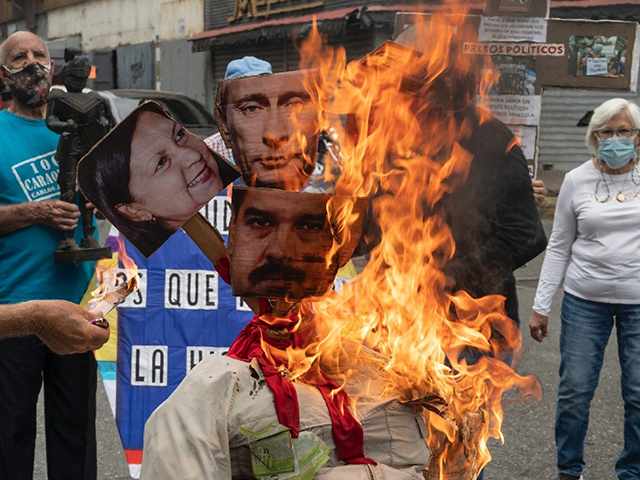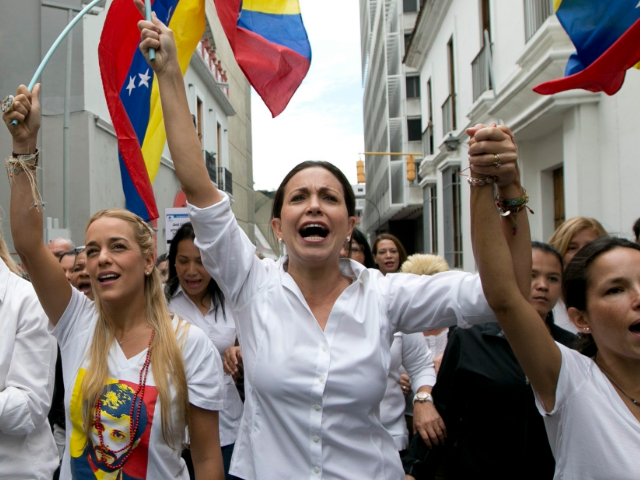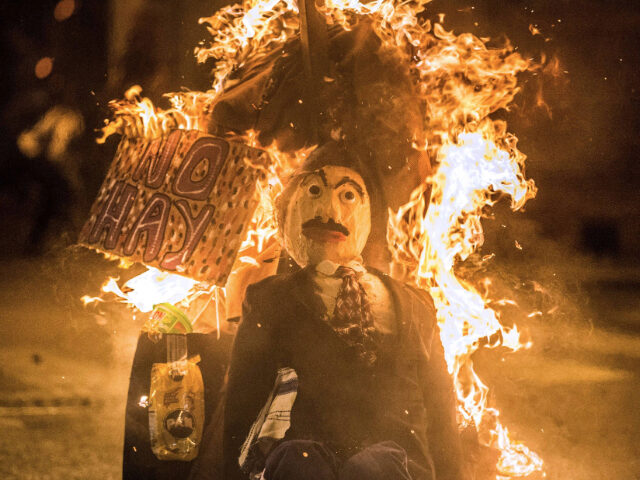Venezuelans in the capital city of Caracas burned an effigy representing socialist dictator Nicolás Maduro and other “opposition” collaborationist figures on Sunday as part of the traditional “burning of Judas” activity held every year on Easter.
The “Burning of Judas” is an annual activity that Catholic communities celebrate in some Latin American and European countries during the Easter weekend in which an effigy of Judas Iscariot is burned to mark the apostle’s betrayal of Jesus Christ, which set in motion the events that culminated with Jesus’s crucifixion, death, and resurrection.
In Venezuela, the celebration is usually held on Easter Sunday. Given Venezuela’s convoluted political history, the “Judas” effigies most commonly resemble politicians, government officials, public figures, and other personalities that each local community and organizer has deemed a threat or guilty of corruption, public betrayal, and other disreputable acts worthy of scorn.

Opponents of the government of Venezuelan President Nicolás Maduro burn a dummy with the images of Maduro (C-Bottom), Russian President Vladimir Putin (C-Top), and Caracas Mayor Carmen Melendez (L) during the traditional “burning of Judas” in Caracas, Venezuela, on April 17, 2022. (Photo by Yuri CORTEZ / AFP)
In Caracas’s Candelaria neighborhood, Sunday’s Judas effigy was a two-headed man that represented socialist dictator Nicolás Maduro — by now a mainstay at the yearly event — and “opposition” candidate Manuel Rosales, the current leftist governor of the state of Zulia and a last-minute signup for Maduro’s July 28 sham presidential election.
Rosales, who is also the leader of the A New Era Party (a member of the Socialist International), has been widely accused of collaborating with the Maduro regime in the past. He is the only main “opposition” candidate allowed to appear on the ballot alongside a dozen lesser-known collaborationists. Rosales chose not to participate in the opposition’s October 2023 primary election, in which María Corina Machado of the center-right Vente Venezuela party was overwhelmingly elected to run against Maduro. Maduro banned Machado from running for public office.

María Corina Machado protestss against “a new coup d’etat on the constitution” in Caracas, Venezuela, on October 13, 2016. (AP Photo/Ariana Cubillos)
“Between the roosters and midnight [hastily], he [Rosales] decided to register his presidential candidacy unilaterally and with his back to unity, trampling on what was the expression of more than three million Venezuelans in the primary elections,” Carlos Julio Rojas, leader of the North Front of Caracas civil association, said before the burning of the effigy.
#Venezuela | EN VIDEO: Vecinos quemaron cerca de Miraflores un "Judas alacrán" con las caras de Maduro y Rosales
📹 Video: Carlos Julio Rojas pic.twitter.com/i9Bi9JATOt
— Caraota Digital (@CaraotaDigital) March 31, 2024
“This is the expression of the torture of the people of Caracas, who demand freedom, who demand democracy,” Rojas said as the effigy burned while the participants chanted, “Freedom!”
“This is not instigation to hatred, it is the message of the people who ask for elections,” he continued.
Rojas told AFP that he has been arrested four times, noting that the Maduro-Rosales effigy was burned because Rosales “made a mafia pact with the dictatorship.”
“Here there are tortured people, without water, without electricity, with starvation wages,” he stressed.
A pocas cuadras de Miraflores caraqueños prendimos en candela al #Judas #Alacrán #Rosales de #Maduro, @manuelrosalesg traicionaste a #Vzla pactando con el régimen tu candidatura @PresidencialVen. @NicolasMaduro como máximo torturador del pueblo usas @cneesvzla–@MinpublicoVEN y… pic.twitter.com/qvktbXxvRL
— Carlos Julio Rojas (@CarlosJRojas13) March 31, 2024
The burned effigy also featured the symbols of Venezuela’s National Electoral Council (CNE) and the National Assembly, which are under the complete control of the ruling socialists and organized and scheduled the sham election.
Additionally, the effigy sported a picture of a “scorpion,” a local slang term used to refer to purported “opposition” politicians who broker deals, conspire, or actively collaborate with the ruling socialists against the best interests of Venezuela’s population, either publicly or behind their own party’s back.
Christian K. Caruzo is a Venezuelan writer and documents life under socialism. You can follow him on Twitter here.

COMMENTS
Please let us know if you're having issues with commenting.